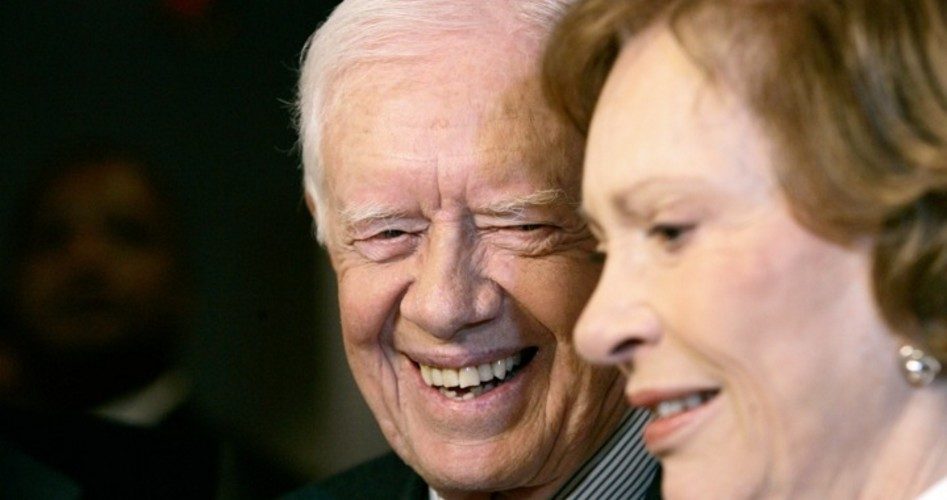
“The United States is abandoning its role as the global champion of human rights,” former President Jimmy Carter wrote in a June 24 op-ed in the New York Times, charging the United States government with assassination attempts through the use of drones and massive domestic surveillance against the privacy rights of American citizens. But Carter cited the United Nations’ Universal Declaration of Human Rights rather than the U.S. Bill of Rights as the inspiration to follow and restore a respect for the inalienable rights of others.
In the column, Carter correctly pointed out: “Revelations that top officials are targeting people to be assassinated abroad, including American citizens, are only the most recent, disturbing proof of how far our nation’s violation of human rights has extended. This development began after the terrorist attacks of Sept. 11, 2001, and has been sanctioned and escalated by bipartisan executive and legislative actions, without dissent from the general public.”
Except for the last part about there being no dissent from the general public (this magazine can be counted among the sharpest critics of these human-rights abuses), Carter hit the mark exactly. He added that surveillance against American citizens are now unbridled by any restrictions of warrants or probable cause:
In addition to American citizens’ being targeted for assassination or indefinite detention, recent laws have canceled the restraints in the Foreign Intelligence Surveillance Act of 1978 to allow unprecedented violations of our rights to privacy through warrantless wiretapping and government mining of our electronic communications. Despite an arbitrary rule that any man killed by drones is declared an enemy terrorist, the death of nearby innocent women and children is accepted as inevitable.
And no true defender of the Constitution can say that Carter is in the slightest bit wrong on any of these points. But where the former President goes wrong is in not pointing to the Bill of Rights of the U.S. Constitution as the example to return to on human rights:
While the country has made mistakes in the past, the widespread abuse of human rights over the last decade has been a dramatic change from the past. With leadership from the United States, the Universal Declaration of Human Rights was adopted in 1948 as “the foundation of freedom, justice and peace in the world.” This was a bold and clear commitment that power would no longer serve as a cover to oppress or injure people, and it established equal rights of all people to life, liberty, security of person, equal protection of the law and freedom from torture, arbitrary detention or forced exile.
The Universal Declaration of Human Rights is a flawed instrument, and is in some respects the exact opposite of the U.S. Bill of Rights. The Universal Declaration’s Article 29 allows a massive loophole for the trampling of human rights that governments always cite as proof they are not violating the Universal Declaration:
In the exercise of his rights and freedoms, everyone shall be subject only to such limitations as are determined by law solely for the purpose of securing due recognition and respect for the rights and freedoms of others and of meeting the just requirements of morality, public order and the general welfare in a democratic society. [Emphasis added.]
This loophole contrasts starkly with the U.S. Bill of Rights. Whereas the Universal Declaration allows limits on rights “as are determined by law,” the First Amendment to the U.S. Constitution allows no exceptions. It allows no law to violate rights:
Congress shall make no law respecting an establishment of religion, or prohibiting the free exercise thereof; or abridging the freedom of speech, or of the press; or the right of the people peaceably to assemble, and to petition the Government for a redress of grievances. [Emphasis added.]
Other amendments in the U.S. Bill of Rights are equally categorical, allowing no exceptions. One might ask of the Universal Declaration: How would one expect governments to take away rights — except “as provided by law”?
The difference between the Universal Declaration and the U.S. Bill of Rights can be chalked up to the authors of both: While the authors of the Bill of Rights bathed in the light of Christian teaching and the Declaration of Independence’s charge that “men are endowed by their Creator with certain inalienable rights,” the United Nations’ founders were atheists and communist spies for Soviet Russia.
Jimmy Carter’s column reveals the strange paradox of the former commander-in-chief: Carter has often been a peacemaker and a voice of conscience since his failed presidency. But despite some virtues, he continues to get his reasoning mixed up on important issues.
Photo of Jimmy Carter: AP Images



